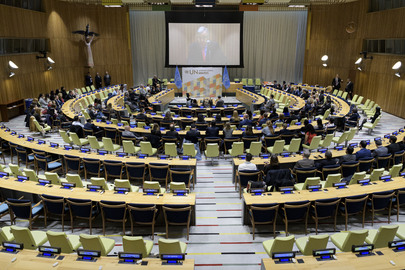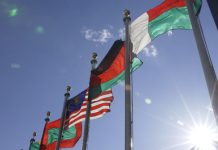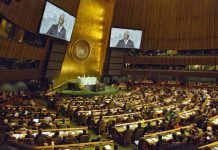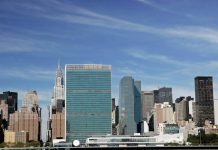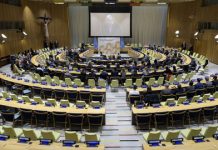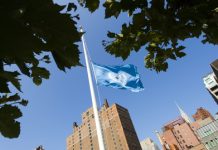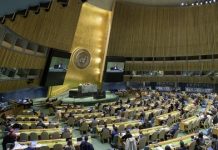UN News: Imran Riza, UN Deputy Special Coordinator, Resident and Humanitarian Coordinator for Lebanon, thank you for joining us today.
First of all, how would you describe the current humanitarian situation in Lebanon as hostilities continue?
Imran Riza: The word that I’ve been using over and over is catastrophic to describe how the humanitarian situation now is. This has been building up for a long time. As we know, it’s a year since the conflict started. It was October 8, as far as Lebanon is concerned. And for most of that period, for about 11-and-a half-months, it was somehow relatively – I mean, it’s difficult to say this – but contained. It was not an all-out escalation. So, over the course of that 11-and-a-half months we had 110,000 persons displaced.
And then what happened on the 23 September, just over two weeks ago, is what was a dramatic level of escalation. In the space of a day or two, we were going from 110,000 displaced to then how well close to 600,000 displaced. What we’ve seen over the last couple of weeks is around 300,000 people that have crossed the border into Syria. Most of them are Syrians, but there are also a lot of Lebanese that went across. So, we have a dramatic, catastrophic humanitarian emergency on our hands over here today.
UN News: In this current situation, what’s the impact of the ongoing violence on infrastructure as well?
Imran Riza: Before I get to the infrastructure, maybe just a few numbers in terms of the overall. As I was saying, there are over 600,000 persons internally displaced. There are 300,000 persons who have crossed the border, most of them Syrian. We think it’s well over a million people that are affected by this.
When we talk about the displaced, it’s about 180,000 that are in almost 1,000 collective shelters. And most of the collective shelters are, of course, schools. And that means that there are probably around 400,000 people that are in other accommodation or with families, or in empty buildings and the like. So, we need to be responding to both those that are in the collective shelters as well as the others and the host families; everyone. There are so many people that are impacted at this time.
The impact has also been as we’ve seen in the strikes, and as we have been trying to advocate, it’s been a huge civilian cost, right? And our advocacy has been on trying to respect international humanitarian law in this conflict; you know, the so-called rules of war at this time. And what we’ve seen is a lot of civilians affected. We’ve seen civilian infrastructure hit. In specific, quite a few health centres have been hit. I think the number has reached some 40 at this point. A lot of healthcare workers have been killed also in this. A lot of civil defense workers have been killed. A lot of frontline responders have been killed. So, the cost on humanitarians is also very high. Of course, we’ve had two of our UNHCR colleagues who sadly lost their lives in the strikes that have happened.
I was mentioning health centres. It’s also water establishments, water infrastructure. There’s some 30,000 people that are without water because of the effects on the water infrastructure that was providing for them. Just yesterday, there was a strike on one of the main conduits of the Litani River, out of the Litani River. We don’t know the impact of that yet, but again, that is going to have a massive impact in terms of water provision.
UN News: If we talk about the UN humanitarian response, can you tell us more about this?
Imran Riza: You know, in a way we were fortunate to have such a strong humanitarian presence in country. We have a very large humanitarian country team here, and as I was saying, for the last year, we’ve been looking at different contingencies and how this might escalate, and trying to be prepared for it. One of the things that we had, I think, the greatest frustration with trying to get prepared was not having the right level of resources or funding. Now, as you may know, just last week we launched a flash appeal for $426 million. This is essential, this is what we need right now to try and cover the current response.
So, the current response is all about shelter, about food, about water, about healthcare, about protection, about all the different aspects that we need to be doing. And what we’re trying to do in this is also work very, very closely with the Government and the government coordination that’s in it. We co-coordinate, we co-lead on the response right now, and in my estimation, it’s worked really well over the last couple of weeks, especially when we’ve had this huge escalation. In order to coordinate, how do we do it? Where do we go for shelter? How do we deal with some of the in-kind contributions that are coming right now, most of them directly to the Government from, for example, the Emirates and Qatar?
In the last few days we’ve had a whole number of flights coming in with the relief supplies there, and we are planning to see how we help the various national institutions also help in terms of the response to their populations in this crisis.
UN News: If we look at all the information that we have right now and the ongoing violence and displacement, what are the most compelling needs?
Imran Riza: I would say that the three most compelling needs that we have right now, the first is clearly a ceasefire. That’s what we want, we need. We need the space for the political actors to work on a political, diplomatic track. We need something sustainable in that way, and we need the firing to stop right now.
While this catastrophe is continuing, as we’re seeing right now, the two other compelling needs, the humanitarian needs per se, in a way, are one: resources. Resources, the funding, the in-kind contributions and the like, in order for us to be able to respond to all the needs of all the people that are affected. And when I talk about affected populations here, I mean, obviously the vast, vast, vast majority are Lebanese, but they’re also Syrians, there are also Palestine refugees, there are also migrants. So, we need resources in order to be able to provide the right humanitarian assistance and protection to them.
And then in order to do this, we need some respect of international humanitarian law. We need the minimum sort of respect of this because it has been extremely difficult in a lot of the areas that are affected to move around, to access people, to have them access us. And as we discussed earlier, there has been a huge impact on civilian infrastructure and on civilians in general. When we look at the caseload of all those that are displaced, some 350,000 are children. That is what we’re facing at this time. So, the call there is very much to have a respect for international humanitarian law.
UN News: What are the challenges facing humanitarian teams’ movement on the ground?
Imran Riza: Well, we have a very active conflict going on. We have a dramatic number of airstrikes happening. Initially, it was very much in the south, and it was in the south and the Beqaa. Now it’s in all parts. It’s even in Beirut. So, what we need is a system that allows us to move safely and be able to deliver assistance for people to also be able to move. So, we’ve called on all parties, and we continue to be in contact with all parties, to try to assure our safe movement. And that’s about notifications and deconfliction and the like.
What we’ve been able to do in this last week is, for example, have a very important relief convoy to deliver relief items to Tyre in the south. And that was WFP, UNICEF, the Norwegian Refugee Council, OCHA, and the Order of Malta, who collectively did this. But the way they could do it was because we were able to assure safe access from the parties as we went with that.
A few days before that, there was the Order of Malta that organized an evacuation of about 1,000 civilians from a place called Ein Ibil, so we were also able to try to assure this. And the way that we do some of this is also our very, very close coordination, collaboration, working together with UNIFIL, because UNIFIL also has very much a protection of civilians mandate.
So, we have been working together with UNIFIL, together with the Government, together with the whole humanitarian community, to try to be as effective as we can in responding to this dramatic level of needs and this, frankly, fear and trauma that people have at this time.
Source of original article: United Nations (news.un.org). Photo credit: UN. The content of this article does not necessarily reflect the views or opinion of Global Diaspora News (www.globaldiasporanews.com).
To submit your press release: (https://www.globaldiasporanews.com/pr).
To advertise on Global Diaspora News: (www.globaldiasporanews.com/ads).
Sign up to Global Diaspora News newsletter (https://www.globaldiasporanews.com/newsletter/) to start receiving updates and opportunities directly in your email inbox for free.


